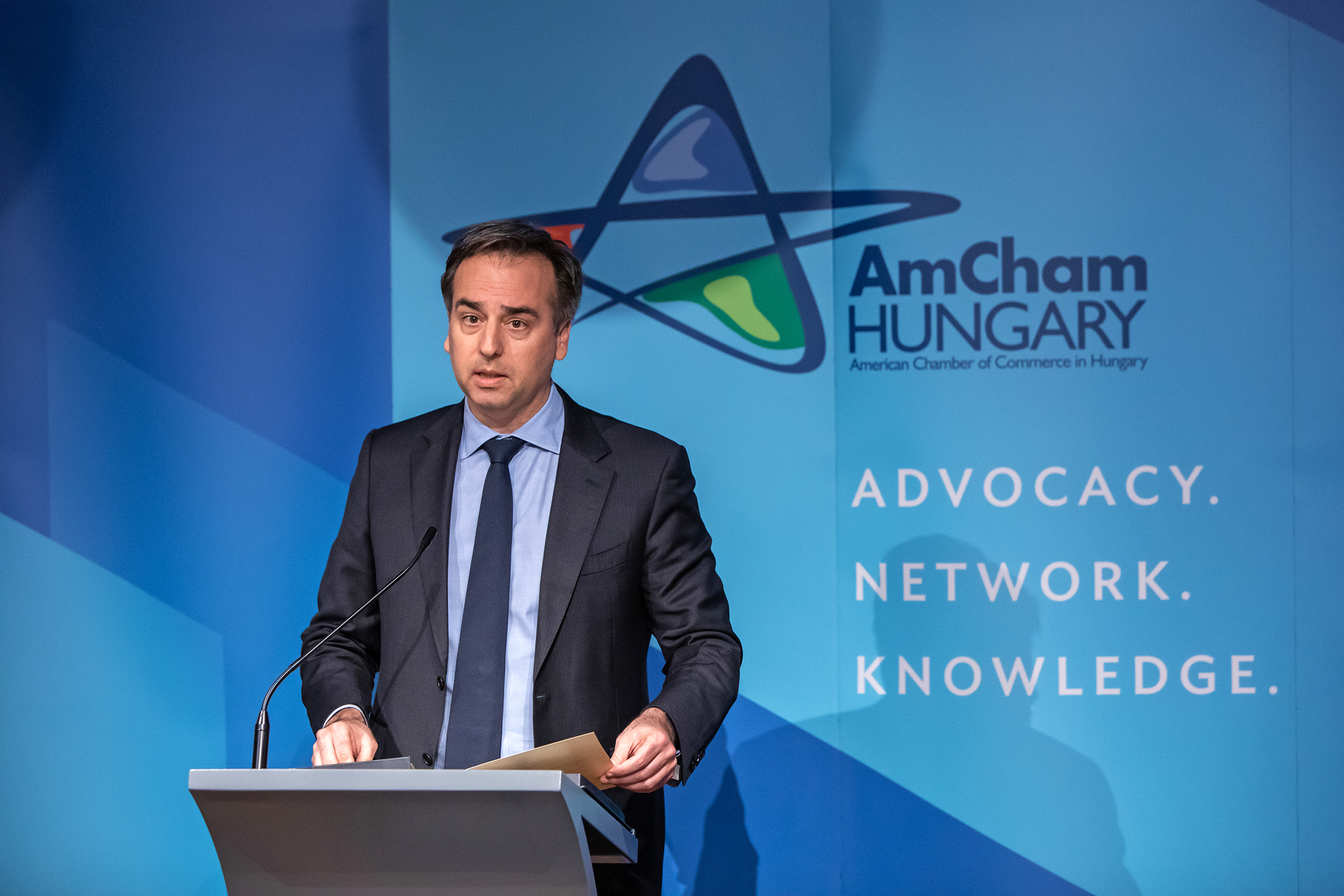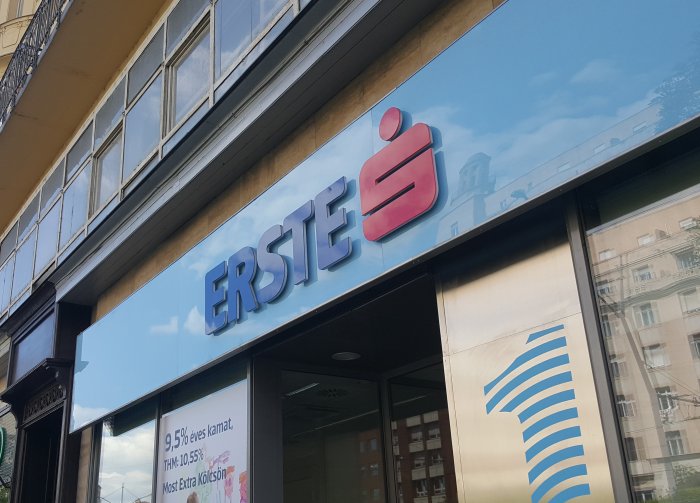U.S. Ambassador Urges Business Leaders to Work for ‘Enduring, Shared Values’

U.S. Ambassador David Pressman.
Photo by Tamás Nagy Hartl / AmCham
In a calmly delivered yet passionate speech to an exclusive dinner for Patron members of the American Chamber of Commerce in Hungary on Dec. 5, U.S. Ambassador David Pressman went from a long list of benefits American businesses offer to Hungarians via Washington’s deep concerns over the policies of Prime Minister Viktor Orbán’s government in recent years to optimism for the future based on the country’s youth.
With all the news of numerous Chinese and other Asian countries’ battery plants and manufacturing investments in recent years, it was, perhaps, appropriate to be reminded of the vital role the United States continues to play in the Hungarian economy.
“We [the USA] are the third largest investor in Hungary, its second most important trade partner, and the top export market outside the European Union,” Pressman said at the start of his speech. “Bilateral trade in recent years has been valued at nearly USD 10 billion in merchandise trade, and another billion in services.”
Yet these numbers are so big, and the impact of U.S. companies so broad, that the raw data can sometimes “obfuscate as well as illuminate” the benefits American investments bring to ordinary people around the country.
To underline this point, the New York-born lawyer reeled off examples of how U.S. companies have directly impacted Hungarian lives, citing, for example, the results of the strategic partnership between the Swiss-based partly U.S.-owned pharmaceutical company Novartis and Budapest’s Semmelweis University.
As a result, Semmelweis is now “one of the only institutions in the region that has access to ophthalmic gene therapies that treat retinal dystrophy, improving the lives of dozens of Hungarian babies by slowing down vision loss and even, in some cases, restoring vision,” Pressman said.
U.S. companies have also played a significant role in training and enabling Hungarian youth to find well-paying, cutting-edge IT jobs. Cisco’s Networking Academy, for example, has helped train nearly 90,000 Hungarian students who have since entered the IT workforce. The ambassador also noted that National Instruments has supported 10 schools serving under-represented and under-served children, giving them access to a year-long robotics program.
Such examples are merely the tip of the iceberg when it comes to the impact of U.S. investment in Hungary.
‘Rolling Dollars’
“The list rolls on and on. So, when the government of Hungary speaks of ‘rolling dollars,’ so do we,” he said, taking a swipe at accusations from the government that “rolling dollars” of U.S. government money had been paid to the Hungarian opposition party alliance before the 2022 elections.
“The dollars rolling into Hungary by U.S. companies are changing lives, employing Hungarians, curing sick babies, treating cancer, healing sick hearts, and more,” Pressman insisted.
In light of this, when Orbán declares the United States to be one of Hungary’s top “adversaries” and states publicly that the U.S. Government is trying to overthrow his party, “these words land not only in Washington D.C. but in your headquarters and in your board rooms,” he stressed.
Such talk, in other words, severely undermines corporate trust in Hungary. Similarly, he warned that when “windfall taxes” are imposed, or Minister of Construction and Investment János Lázár declares foreign companies in specific sectors “persona non grata,” recommending they sell their firms and get out, “the impact on foreign investment is real.”
Equally, Pressman highlighted U.S. concerns over the draft before parliament of the “Sovereignty Protection” bill.
“When the government proposes to create a new domestic security agency, armed with unfettered and unchecked investigative powers, including tapping the nation’s intelligence services, issuing subpoenas, demanding documents from and depositions of anyone involved in ‘democratic debate,’ all without judicial oversight, it is alarming,” he said, declaring the draft “makes Moscow’s foreign agent law look mild and meek.”
After leaving the Soviet-era Warsaw Pact military grouping and Comecon, its trading arm, in the early 1990s, Hungary had embraced and been accepted as a member by the NATO Western defense alliance and the European Union. Moreover, it “was a shining symbol of success among those countries to emerge from behind the Soviet Union’s Iron Curtain,” the ambassador argued.
Yet today, “alone among our Allies, Hungary’s leadership seems to think of Hungary’s membership in NATO as a contract rather than a covenant,” he said. “We have committed to be willing to shed American blood to defend Hungary not because it fulfills its narrow, contractual obligations, devotes a certain percentage of the budget to its military, participates in joint exercises, etc., but because we are both members of this community of values,” Pressman emphasized.
Crucially Needed Aid
Despite Hungary’s reliance on NATO allies for its security, its political leadership “feels comfortable disregarding the interests of those same allies, including during a time of war in Europe,” he said. “That disregard is evident when the Prime Minister embraces [Russian President Vladimir] Putin, when his government threatens to hold up crucially needed aid to its neighbor, Ukraine, while Ukrainian men, women, and children are murdered by war criminals.”
Pressman rounded on the Hungarian PM’s recent explanation that Hungary’s foreign policy philosophy was, by design, “radical,” saying, “I would submit that it is in our countries’ national interest to sustain a foreign policy grounded in enduring values, shared interests, and long-term strategic commitments among allies, one that has yielded unprecedented strategic benefits.”
Declaring that he remained an optimist about Hungary’s future, especially regarding its youth, the diplomat concluded, “We, all of us, need to do everything we can to offer them a bright future for Hungary and its relationship with the United States. I understand that the business world has a bottom line to watch. [….] I’m grateful for everything you do to represent American interests and values here.”
It was stirring stuff, but the question remains: is it likely to substantially and positively induce any change in the Hungarian government’s policies?
“No,” opined Zoltán Ranschburg, a senior analyst with Republikon Institute, a liberal-leaning think tank, speaking afterward to the Budapest Business Journal.
“As we have seen from time to time, strong criticism only triggers stronger counter-reactions from the government’s side, and this [will prove] no exception,” he said, noting that Minister of Foreign Affairs and Trade Péter Szijjártó had already referred to the speech as an “outburst,” claiming that it wasn’t in Pressman’s interest for the United States and Hungary to have a good relationship.
Could, at least, Pressman’s appeal for support from AmCham’s business elite yield positive results? Perhaps, but for Ranschburg, it was unclear from the speech what the ambassador expects from the corporate leaders in representing American interests and values.
“This could range from operating an inclusive business model to supporting Budapest Pride,” he said. “Nevertheless, Pressman’s words were a guarantee of government support to the American companies acting in line with the values represented by the U.S.”
This article was first published in the Budapest Business Journal print issue of December 15, 2023.
SUPPORT THE BUDAPEST BUSINESS JOURNAL
Producing journalism that is worthy of the name is a costly business. For 27 years, the publishers, editors and reporters of the Budapest Business Journal have striven to bring you business news that works, information that you can trust, that is factual, accurate and presented without fear or favor.
Newspaper organizations across the globe have struggled to find a business model that allows them to continue to excel, without compromising their ability to perform. Most recently, some have experimented with the idea of involving their most important stakeholders, their readers.
We would like to offer that same opportunity to our readers. We would like to invite you to help us deliver the quality business journalism you require. Hit our Support the BBJ button and you can choose the how much and how often you send us your contributions.










